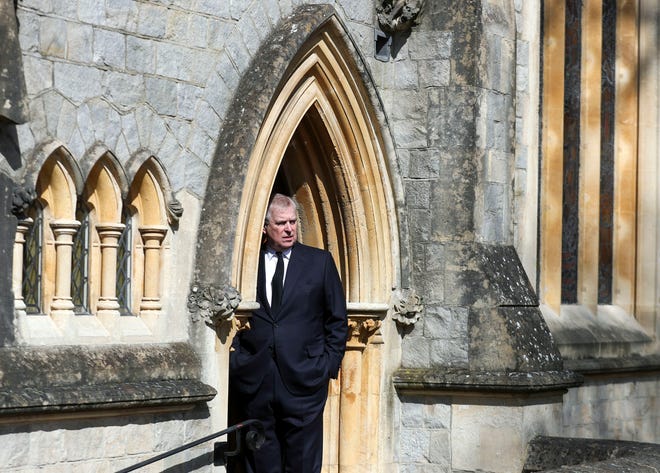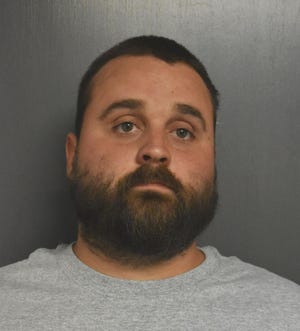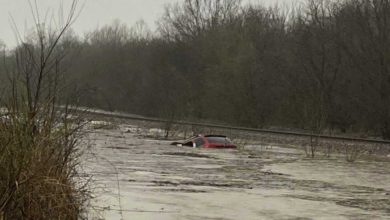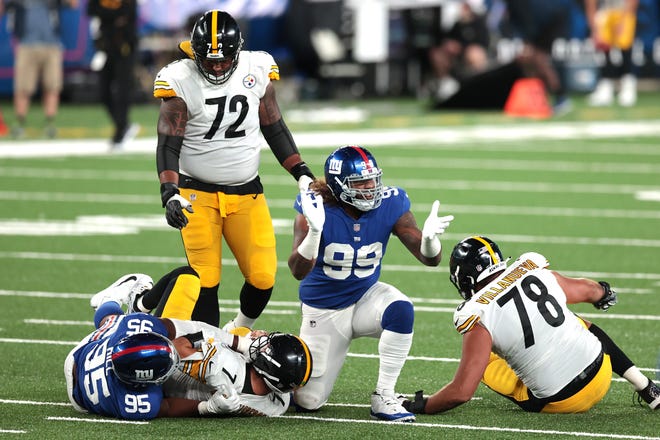
Have you been served, Prince Andrew?
Looks like it. On Friday, an affidavit turned up in New York federal court in which a process server in London attests that he went to Andrew's residence, Royal Lodge on the Windsor Castle estate, on Aug. 27 and delivered documents from Virginia Roberts Giuffre's shocking sex-abuse lawsuit, tucking them in a plastic sleeve and an A4 envelope and leaving them with a police officer on duty at the main gates to the property.
But don't expect to hear the Duke of York calling in to a federal courtroom in New York Monday afternoon to address the lawsuit; instead, he's likely to be far, far away in the Scottish highlands.
You can expect, however, to hear Giuffre and her celebrity lawyer, David Boies, calling in to lament to a federal judge about all the trouble they've had serving Andrew with the sexual-abuse lawsuit she filed against him last month.
In the affidavit, process server Cesar Augusto Sepulveda attested that he asked to see Andrew in person but was told it's not possible. Where is he? The cop said he couldn't answer questions, according to the affidavit, but "stated that by leaving there, the Court process would be forwarded on to the Legal Team."
He did not hand the papers personally to Andrew, but asserted that the "service" was "in accordance with Section 6 of the Civil Procedure Rules" of the United Kingdom.
Sepulveda also described going to Royal Lodge the day before, Aug. 26, and getting the runaround, leaving him with the impression that "security staff had been primed not to allow anyone access on to the property to service court process and instructed not to accept any service."
He tried to contact Andrew's lawyer, Gary Bloxsome of the Blackford's law firm in London, but he never returned the call. So his employers instructed him to return to Royal Lodge the next day and try again.
According to federal rules in civil cases, Andrew now has 21 days to respond to Giuffre's lawsuit. He is not expected to do so.
Serving the paperwork on a defendant is step one after filing a civil suit, a step some defendants seek to evade, usually without success. But it's more difficult when the defendant – this one the second son of Queen Elizabeth II, ninth in line to the throne – is a foreign citizen residing in a foreign country (during a pandemic).

Andrew, 61, has access to castles, high walls and palaces that couriers and process servers can't easily penetrate, such as the queen's 50,000-acre Balmoral Castle estate in remote Scotland. The queen usually spends her late summer holiday there, about two months in its splendid isolation.
Earlier this week,The Sun and The Telegraph published pictures of Andrew and his ex-wife, Sarah, Duchess of York, arriving by car at Balmoral and at an isolated lodge in a secluded estate forest a few miles from the castle. This earned him more mocking tabloid headlines: "Runaway Prince," jeered The Sun.
Process serving was expected to be the main topic at the virtual hearing Monday but now that may change due to Sepulveda's affidavit. U.S. District Judge Lewis Kaplan in Manhattan is presiding at the hearing, the first since Giuffre, 38, filed her suit, believed to the first such action against a senior royal in modern times.
It remains to be seen whether Andrew’s lawyers will challenge the process service and on what grounds. ABC News reported it obtained a letter from Bloxsome to a British court official in which he challenged the service as “improper” under British law.
In the suit, Giuffre reiterated accusations she's publicly made against Andrew since January 2015: She accuses him of rape and sexual assault, claiming she was sex-trafficked to him at age 17 by Andrew's former friend, the late convicted sex offender Jeffrey Epstein, and that the prince knew it at the time.
Andrew has vehemently denied all her accusations, and Buckingham Palace publicly backed him. He claims he never met Giuffre despite the existence of a picture of them together posted on the internet.
The Bloxsome letter also raised another issue that Andrew might use to challenge the validity of Giuffre’s lawsuit: Does a 2009 settlement agreement she signed with Epstein potentially release Andrew from any liability for the sexual abuse accusations she has made against him?
Just last month, according to documents on file in federal court, Giuffre dropped her claim of sexual battery she made against lawyer Alan Dershowitz, who formerly represented Epstein, after Dershowitz invoked this part of the settlement agreement; her move received little public notice at the time.
Now Dershowitz is seeking the permission of U.S. District Judge Loretta Preska, who is presiding in his lawsuit with Giuffre, to release the relevant portions of the settlement agreement to Andrew’s lawyers. Preska has not yet ruled.

So far, Andrew and his lawyers at Blackford's have chosen not to engage with the lawsuit: They haven't responded publicly in any way and neither has Buckingham Palace.
Andrew and his lawyers are not expected to participate in Monday's hearing. To do so would suggest he will engage, and his legal strategy appears to be non-cooperation while taking advantage of the complexities of international law, according to lawyers following the case.
"His lawyers know what they're doing and they're not having him cooperate in either civil or criminal proceedings," says Mark Stephens, a specialist in international law with the prominent London firm Howard Kennedy. "He will not be coming to the U.S. anytime soon, and he is protected by those high castle walls."
Due to the pandemic, the hearing will be conducted by remote access; Boies, a lawyer as famous as his clients, is based in New York. Giuffre, an American from Florida, is now married, a mother and lives in Western Australia.

Boies and Giuffre have made no secret of their aims; they've been declaring them in public for months:
They want to warn Andrew not to ignore the lawsuit or face serious if unspecified consequences. They want to prove that even "rich and powerful" people can be held accountable.
Most of all, they want to shame him into cooperating with New York federal prosecutors by giving "evidence" in the ongoing criminal case against Epstein associate Ghislaine Maxwell, a longtime friend of Andrew's who's also been sued by Giuffre.
In an interview with the BBC last month, Boies said the lawsuit is the only way to "establish once and for all what the truth is."
The prince says he doesn't know anything about the Maxwell case or Epstein's activities, and he's already demonstrated he will ignore the lawsuit. And legal experts suggest he could get away with that, albeit with another devastating hit to his tattered reputation.
Even if Giuffre wins a default judgment against him in New York and Andrew is ordered to pay her millions in damages, "it can't be enforced in the United Kingdom without there having been a contested hearing" in the American court, Stephens says.
Thus, further reason for Andrew and his lawyers to not engage in order to avoid even the appearance of "contesting" the Giuffre lawsuit.
Source link









